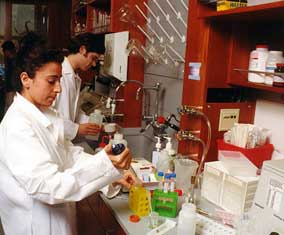 The biotechnology revolution, fueled by the sequencing of the human genome, will affect every aspect of the way we live, from our environment, to what we eat, to how we diagnose and treat illness. Already, biotechnology has improved the quality of our lives. In the next decade, as the pace of advances in biotechnology accelerate, the scope and volume of biotechnology’s effects will be even greater.
The biotechnology revolution, fueled by the sequencing of the human genome, will affect every aspect of the way we live, from our environment, to what we eat, to how we diagnose and treat illness. Already, biotechnology has improved the quality of our lives. In the next decade, as the pace of advances in biotechnology accelerate, the scope and volume of biotechnology’s effects will be even greater.
What is biotechnology? In its broadest definition, biotechnology is the use of advances in molecular biology for applications in human and animal health, agriculture, environment, and specialty biochemical manufacturing. In the next century, the major driving force for biotechnology will be the strategic use of genomic information. With the completion of the human genome project, the subsequent understanding of what these genes code for and how the products of these genes relate and interact, will completely transform the practice of medicine. It is now possible to translate discoveries in bacteria, yeast, or fruit flies into important therapeutic targets for drug discovery. DNA chip diagnostics, cell and gene therapy, and tissue engineering will emerge over the next ten years as important biotechnology products.
Biotechnology– the interdisciplinary frontier between biology, engineering, medicine and plant science– is also the scene of exciting scientific and technological developments in many areas of science. Important areas of development include:
- Recombinant DNA
- Producing New Crop Species
- Clinical Diagnostics
- Medical Therapy
- Bioinformatics and Processing
- Producing Biomaterials